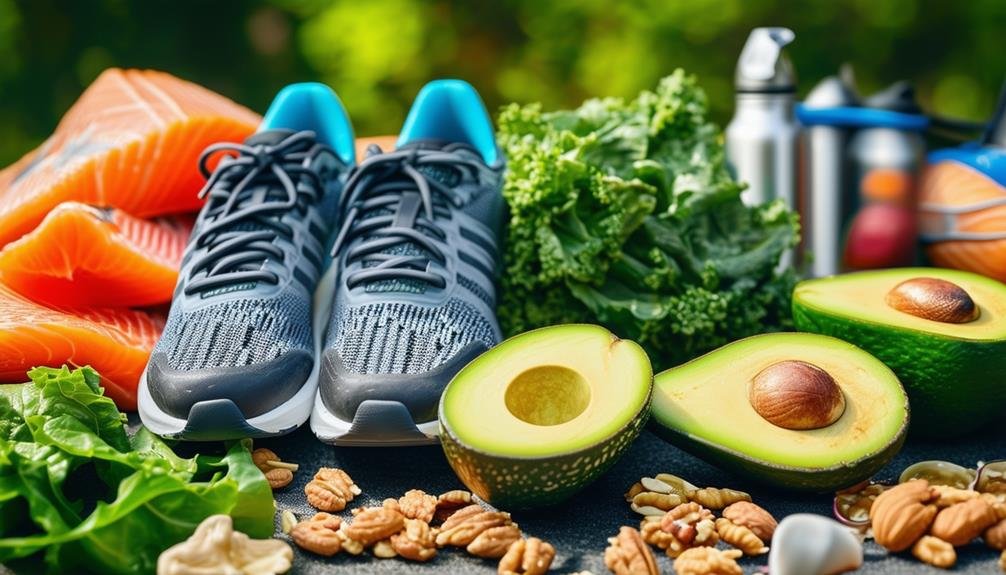To effectively optimize your keto diet for endurance sports, prioritize achieving fat adaptation while carefully managing your carbohydrate intake.
Target a macronutrient balance comprising 70-80% fats, 15-25% proteins, and 5-10% carbohydrates. Gradually lower your carbohydrate consumption to reduce the probability of experiencing 'keto flu' symptoms.
Additionally, consider strategic carbohydrate timing before and during high-intensity workouts to enhance performance. Consuming 20-30 grams of digestible carbohydrates can offer quick energy boosts without disrupting your state of ketosis.
It's crucial to maintain a proper electrolyte balance, as a reduced carbohydrate intake may lead to deficiencies that can impact your performance.
Tailoring your nutrition to meet your individual needs is vital for optimizing both endurance and recovery during training and competitions. Further insights and personalized adjustments can enhance your dietary approach.
Key Takeaways
- To achieve ketosis effectively, aim for a macronutrient ratio that consists of 70-80% fats, 15-25% proteins, and only 5-10% carbohydrates.
- Gradually lower your carbohydrate intake to help alleviate potential 'keto flu' symptoms during the adaptation phase.
- Utilize strategic carbohydrate consumption around high-intensity training sessions to enhance energy levels and preserve glycogen reserves.
- Regularly monitor your electrolyte balance, ensuring adequate intake of sodium and potassium to prevent performance-inhibiting imbalances.
Understanding Ketosis for Athletes
Understanding ketosis is essential for athletes aiming to improve their endurance by utilizing fat as a primary energy source. Ketosis is a metabolic state achieved through significant carbohydrate restriction, prompting the liver to convert fatty acids into ketone bodies. These ketones provide an alternative energy source for endurance athletes, facilitating the use of fat as fuel.
In ketosis, athletes can preserve their glycogen stores, which may enhance performance during prolonged exercise sessions. Enhanced fat oxidation is a notable benefit, allowing for sustained energy levels over longer durations without rapid glycogen depletion. However, reaching this state often involves an adaptation phase lasting two to four weeks. During this period, some individuals may experience 'keto flu' symptoms, including fatigue and reduced mental clarity.
It's crucial to recognize that responses to ketosis differ among individuals. Factors such as metabolic rate, training intensity, and personal health can affect how well one adapts to this dietary strategy. Therefore, adopting a personalized dietary approach is essential for optimizing performance.
Successful Keto Athletes
Numerous athletes have successfully adopted a ketogenic diet, demonstrating its effectiveness in endurance sports.
Notable examples include ultra-marathoner Zach Bitter and cyclist Romain Bardet, both of whom have achieved extraordinary accomplishments while adhering to keto principles.
Their stories, alongside feedback from various age-group athletes, underscore the significant performance benefits of a ketogenic approach.
This emphasizes the importance of crafting personalized nutrition plans that cater to the unique requirements of each athlete.
Notable Keto Athletes
Notable athletes such as Zach Bitter and Romain Bardet have demonstrated that a ketogenic diet can significantly enhance performance in endurance sports.
Zach Bitter, an ultra-marathon runner, holds multiple world records and credits much of his success to improved fat oxidation—a primary benefit of the ketogenic lifestyle. This diet allows athletes like him to rely on fat as their main fuel source, which is crucial for sustaining energy during long races.
Romain Bardet, a professional cyclist, has also seen success while following a ketogenic diet, highlighting its effectiveness in competitive cycling. Additionally, triathlete and coach Ben Greenfield emphasizes the role of strategic carbohydrate management alongside a high-fat diet, which can optimize endurance performance.
Many age-group athletes have reported improvements in performance and recovery after adopting a ketogenic diet, supporting its rising popularity in endurance sports. However, responses to the diet can vary significantly among individuals, suggesting that personalized nutritional strategies may be necessary to help athletes maximize their performance and recovery.
These notable keto athletes exemplify the potential of the ketogenic diet to enhance endurance capabilities.
Personal Success Stories
Athletes who've adopted the ketogenic diet frequently share motivating success stories that highlight its positive effects on endurance and performance.
Take ultra-marathon runner Zach Bitter, for example; he attributes his multiple world records to his keto diet, proving that a low-carb, high-fat approach can yield remarkable results in endurance sports. Likewise, professional cyclist Romain Bardet has achieved significant victories while following a ketogenic plan, demonstrating its effectiveness for elite endurance athletes.
Many age-group athletes have also reported considerable improvements in their endurance and recovery times after transitioning to a ketogenic diet. They experience enhanced fat oxidation during extended exercise, which helps to conserve glycogen stores and sustain energy levels throughout their competitions.
Additionally, triathlete and coach Ben Greenfield advocates for a strategic intake of carbohydrates to complement a high-fat diet, stressing that personalized nutrition can lead to performance enhancements tailored to individual requirements.
These success stories emphasize the ketogenic diet's potential for athletes, providing valuable insights for those aiming to boost their endurance through optimized energy levels and targeted dietary strategies.
Performance Impact and Insights
Successful keto athletes such as Zach Bitter and Romain Bardet illustrate the significant benefits of fat adaptation in enhancing endurance performance and recovery. Their experiences show that a structured ketogenic diet can improve fat oxidation, decreasing dependence on carbohydrates during prolonged endurance events.
For instance, ultra-marathon runner Zach Bitter has set world records while following a high-fat nutritional approach, emphasizing the potential of keto to support extreme endurance activities. Similarly, cyclist Romain Bardet has thrived in competitive cycling by adopting a ketogenic diet, reinforcing the idea that fat adaptation benefits various endurance sports.
Many athletes report sustained energy levels during lengthy workouts and enhanced recovery times as they adapt to this dietary regimen, effectively utilizing fat stores for consistent energy availability. Additionally, while some individuals, such as Ben Greenfield, may incorporate strategic carbohydrate intake, the primary focus remains on maximizing fat utilization for energy.
It's important to recognize that individual responses to a ketogenic diet can differ. However, numerous endurance athletes report positive performance outcomes, suggesting that the keto diet may be a viable option for those aiming to enhance their athletic performance.
Research Insights on Keto Performance

Research indicates that the effectiveness of a ketogenic diet on endurance performance can vary significantly among athletes. Some individuals may experience improved fat oxidation and enhanced performance, while others may encounter challenges due to reduced glycogen levels. A systematic review reveals mixed outcomes, where some studies show an increase in VO2 max, while others report no substantial changes. This variability underscores the importance of individual responses to the ketogenic diet.
During the adaptation phase, often referred to as the 'keto flu,' many athletes report temporary declines in performance, including symptoms such as fatigue and irritability that can persist for two to four weeks as the body transitions from carbohydrate to fat as its primary fuel source. Furthermore, the restriction of carbohydrates in a ketogenic diet can limit glycogen availability, which is crucial for endurance activities, potentially leading to decreased performance in some athletes.
Managing electrolyte levels is essential, as imbalances can occur on a ketogenic diet, adversely affecting hydration and muscle function. This aspect further influences overall performance outcomes, highlighting the necessity for effective hydration strategies.
Considering the individual variability in responses to a ketogenic diet, it's vital to adopt personalized nutritional strategies to optimize both performance and recovery. Customizing your dietary approach can facilitate better adaptation to fat oxidation while mitigating any negative effects. By addressing these factors thoughtfully, athletes can achieve a balance that aligns with their specific performance needs.
Common Drawbacks and Side Effects
When transitioning to a ketogenic diet, you may encounter common challenges such as the 'keto flu,' characterized by symptoms like fatigue and headaches during your body's adjustment period.
Additionally, lower carbohydrate intake may lead to electrolyte imbalances, resulting in muscle cramps and dehydration.
It's important to be mindful of these potential drawbacks, as individual responses can vary significantly, which can impact your endurance performance.
Keto Flu Symptoms
Keto flu symptoms typically emerge as your body adapts to a significant reduction in carbohydrate intake. This adjustment period may lead to fatigue, irritability, headaches, dizziness, and nausea as your body transitions from utilizing glucose for energy to relying on fat and ketones.
To provide insight into these common keto flu symptoms and their potential impact on energy levels and training performance, the following table summarizes key details:
| Symptom | Description | Impact on Training Performance |
|---|---|---|
| Fatigue | General energy depletion due to lower carb intake | Reduced motivation and decreased performance |
| Irritability | Mood fluctuations and heightened stress | Impaired focus during exercise |
| Headaches | Often a result of carbohydrate withdrawal and dehydration | Can distract and induce fatigue, hindering workouts |
| Dizziness | Sensation of lightheadedness | May affect balance and exercise safety |
Staying properly hydrated is crucial during this transition, as it can mitigate symptoms and facilitate a smoother adaptation to lower carbohydrate consumption.
Electrolyte Imbalances
Many athletes following a ketogenic diet may encounter electrolyte imbalances due to lower carbohydrate consumption and heightened mineral loss through sweating and urination. This can result in deficiencies in essential electrolytes like sodium, potassium, magnesium, and calcium. When these minerals become depleted, athletes might experience symptoms such as muscle cramps, fatigue, and hindered recovery.
The risk of electrolyte imbalances increases during endurance activities as perspiration significantly contributes to mineral loss. Symptoms can resemble 'keto flu,' leading to dizziness, headaches, and irritability, all of which can impair athletic performance. To combat these deficiencies, maintaining proper hydration is crucial.
Electrolyte supplementation is particularly beneficial for athletes on a ketogenic diet. Emphasizing the replenishment of sodium and potassium can support muscle function and overall hydration during workouts. Additionally, magnesium and calcium are important for enhancing performance and recovery, so including them in your supplementation strategy is wise.
Tailoring Nutritional Plans

Tailoring your nutritional plan as an endurance athlete following a ketogenic diet involves careful consideration of your specific macronutrient needs to enhance both performance and recovery. Typically, this entails achieving a macronutrient distribution of 70-80% fats, 15-25% proteins, and only 5-10% carbohydrates. Optimizing these ratios helps to fulfill your energy requirements for intense training and competitive events.
When transitioning to a ketogenic diet, you may experience a temporary phase known as 'keto flu,' characterized by fatigue and discomfort. To mitigate these symptoms, it's advisable to gradually decrease carbohydrate intake while boosting healthy fat consumption.
For endurance athletes, strategically timing carbohydrate intake around high-intensity workouts can improve performance. Consuming 20-30 grams of quickly digestible carbohydrates may provide an effective energy boost without significantly interfering with ketosis. Additionally, maintaining adequate hydration and electrolyte levels is crucial. As you limit carbohydrates, an increased intake of sodium, potassium, and magnesium may be necessary to avoid imbalances that could negatively affect performance.
Consulting with a sports nutritionist can significantly improve your dietary success. They can assist in making personalized dietary modifications based on your unique metabolic responses, training volume, and performance objectives. This partnership ensures you receive the appropriate nutrients that support your endurance activities.
Strategic Carb Timing and Use
Strategic carbohydrate timing can significantly enhance your performance during high-intensity workouts and extended endurance events. By carefully planning your carbohydrate intake around these training sessions, you can boost your energy levels and overall performance.
Focus on effectively timing your carbohydrate consumption. Eating carbohydrates before and during workouts helps maintain glycogen stores, essential for sustaining energy in high-intensity efforts exceeding 90 minutes. Ideal sources include rice cakes, energy gels, and fruits. Incorporating these into your pre-workout or race nutrition ensures you're optimally fueled for peak performance.
It's crucial to monitor your individual responses to carbohydrate timing. Some athletes may benefit from increased carbohydrate intake during training while still adhering to a ketogenic approach at other times. Experimenting with your carbohydrate consumption can help identify what works best for your body. Gradually increasing your carb intake leading up to endurance events can be particularly effective to prevent energy crashes.
Remember, strategic carbohydrate timing isn't merely about adding carbs to your diet but integrating them in a way that supports your training and aligns with your body's requirements. Fine-tuning this strategy can lead to improved performance in endurance events, helping you achieve your goals more effectively.
Balancing carbohydrate timing with your overall ketogenic approach can yield substantial benefits, fostering sustained energy and better outcomes in both high-intensity and endurance sports.
Frequently Asked Questions
Can Endurance Athletes Be on a Keto Diet?
Yes, endurance athletes can successfully follow a keto diet. To do so, it's important to incorporate strategies for keto adaptation, prioritize high-fat fuels, and pay attention to nutritional timing. This approach helps maintain energy levels even during periods of glycogen depletion, while also enhancing fat oxidation and optimizing endurance performance.
How Do I Increase My Stamina on Keto?
To enhance your stamina while following a keto diet, prioritize fat adaptation and strategic meal timing. Incorporate keto-friendly supplements, closely track your training intensity, and maintain a proper balance of electrolytes. You may also explore carbohydrate cycling to optimize energy levels. Additionally, ensure adequate recovery nutrition and foster a positive mental focus for improved performance.
Is the Keto Diet Good for Distance Runners?
The keto diet can offer potential benefits for distance runners by enhancing fat adaptation and improving energy levels. However, it is crucial to carefully manage glycogen storage, assess performance metrics, and optimize factors such as recovery times, training intensity, meal timing, and electrolyte balance to ensure optimal performance.
Does Keto Improve VO2 Max?
The ketogenic diet may enhance fat oxidation and endurance performance, much like a chameleon adapting to its surroundings. However, it does not guarantee an increase in VO2 max, as individual results can vary based on factors such as energy availability and the intensity of training.
Conclusion
To effectively optimize your keto diet for endurance sports, it's essential to make strategic adjustments and focus on proper fueling.
Prioritize meeting your nutritional requirements while considering potential challenges that may arise.
By implementing a deliberate carbohydrate timing strategy, you can enhance performance and sustain energy levels during your activities.
A well-rounded approach will yield positive outcomes, assisting athletes in reaching their peak potential while adhering to a ketogenic lifestyle.
Embrace this dietary framework to successfully improve your endurance capabilities.
